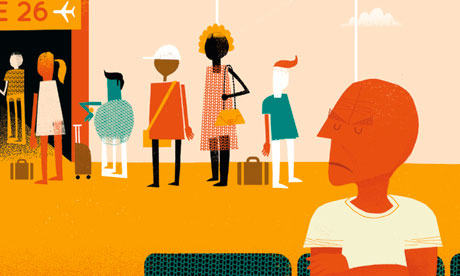
Serial killers are bad, I know, but I'm fairly sure there's no more outrageous example of human depravity than people who board aeroplanes before their row number's been announced. No, hang on: the airline staff who let them get away with it are worse. Meanwhile, we pathetic rule-followers stand there tutting and glowering, powerless to avenge the crime. (We could sneak on early ourselves, but where's the smug sense of moral superiority in that?)
So it gave me some satisfaction to encounter research by Lily Lin, of the University of British Columbia, suggesting that when customers witness such "norm violations" going unpunished, they're liable to transfer their animosity to the company or product involved. Learn from that, airline operators, and start enforcing the rules! By the way, I was obviously joking about queue-jumpers being worse than serial killers; actually, I think they're roughly equal.
What could explain the peculiar fury that everyday rule-breakers – queue-jumpers, personal space invaders, late-joining motorway lane-mergers, etcetera – seem to trigger? It's tempting to dismiss my airport irritation as simple self-interest: you get on the plane before me; I have to wait a little longer, so I give you a dirty look. But social psychologists have shown that those tuts and looks are more than pissed-off outbursts. They're tiny punishments, meted out not just to make the punisher feel better, but to uphold the social order. Daily life, from this perspective, is a finely calibrated system of justice, with violators constantly sanctioned by a volunteer police force, to which we all belong. That's right: when I cross my arms, sigh audibly and shake my head, I'm doing a public service.
The proof that this isn't mere selfishness is how far we're willing to inconvenience ourselves to make sure the punishment hits home. In one of Lin's experiments, consumers were asked to sample various brands of cheese and crackers, and took longer to do so – wasting their own time – when another "consumer", really a confederate of the researcher, was invading their space, breathing down their necks. (They also liked the cheese and crackers less.)
In their new book Top Dog: The Science Of Winning And Losing, Po Bronson and Ashley Merryman cite another study, conducted in the car park of an Atlanta shopping mall: drivers exiting a parking space took twice as long when someone else was waiting to get in. And I'd be willing to bet they took even more time when the incoming driver was being impolitely eager for the space.
Not that we're just vindictive little Hitlers: the latest work by Lin and her colleagues shows that these micro-punishments are highly attuned to context. We'll punish people less if they're already visibly disadvantaged – with a medical condition, say – or if we've seen them already get punished. Then again, we're also hierarchy-loving traditionalists: in one experiment, people showing up late for an appointment got sanctioned less if they mentioned a job interview with Procter & Gamble than one at a cafe. Apparently, we feel the social order's less threatened when the person violating the norm is powerful. There isn't one rule for the rich and another for the poor, but there are different penalties for breaking it.
oliver.burkeman@theguardian.com
• Follow Oliver on Twitter.

